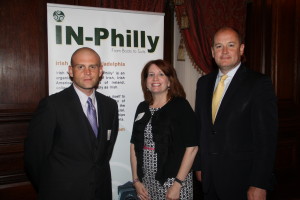Bethanne Killian, Chair of Irish Network Philadelphia (better known as IN-Philly), knew she wanted to create an event for the organization that would commemorate the 150th anniversary of the Battle of Gettysburg, and the key role that the Irish played in it. She found the perfect speaker in Kenneth Gavin and the ideal location at the Union League in Center City.
The Union League itself was formed in 1862, in order to preserve the Union as well as to help squash the rebellion of the Confederacy. As Gavin said in the opening of his talk, “You can’t get a better venue in Philadelphia than the Union League to talk about these things.”
Kenneth Gavin, a self-proclaimed mongrel with his share of Irish ancestry, has himself participated in Civil War reanactments as part of the recreated Company C, 28th Pennsylvania Volunteer Infantry; he is now the company’s 1st sergeant. His day job since February of this year has been as Director of Communications for the Archdiocese of Philadelphia, but his love for, and research in, the field of history continues.
In an engaging and energetic talk that lasted over an hour, but wasn’t nearly long enough, Gavin spoke not only about Gettysburg, but also about the factors that led up to the Civil War, and how the Irish came to play such a major part in the action.
His explanation of how over 150,00 native born Irish men ended up serving in the Federal ranks (Gavin estimates that when it comes to the number of first generation Irish Americans who served, the number is high in the hundreds of thousands) gave some serious insight into the social and political background of the post-famine Irish living in the U.S.
“It’s a huge, huge contribution. What motivated those men to serve? To put life and limb on the line for an adopted country, an adopted country that at best had been indifferent to them, and at worst, hostile. These are young men—17, 18, 19, 20 years old—who have no concept of war. They’re searching for acceptance socially, and they’re searching for upward mobility. Think about the conditions of the jobs they’ve been doing in factories, and in building the infrastructure of America—the poverty level living, the social atmosphere, the oppression, the discrimination that comes along with those things.
“And what the military is going to promise these guys—well, you get $13 a month, which was a pretty decent wage at that point in time. That’s what well paid factory workers were usually making. That’s enough to support a family, roughly. You’re getting a promise of a good suit of clothes, and whenever they wear out, the military’s going to give you a new one. You’re going to eat three fine meals a day. And you’re going to have adventure, you’re going to see the country. And the girls are going to love you for serving.
“These are the promises the recruiting officers have made since the inception of the United States of America. It doesn’t mean you’re going to get all that, but at the time, those are the promises that are out there. So, you can see where everything starts to add up that this is going to be a good idea.”
As special guest Peter Ryan, the Deputy Consul General of Ireland who traveled down from New York for the event, stated, “It’s really extraordinary, this history of the Irish people in the American Civil War; there were so many who served in the U.S. forces, in many cases before they had a chance to become U.S. citizens. And they still came and showed their devotion to their new country—while at the same time a little bit of their heart remained in Ireland.”
Here’s where you can find more information about IN-Philly, including upcoming events, and how to join.

